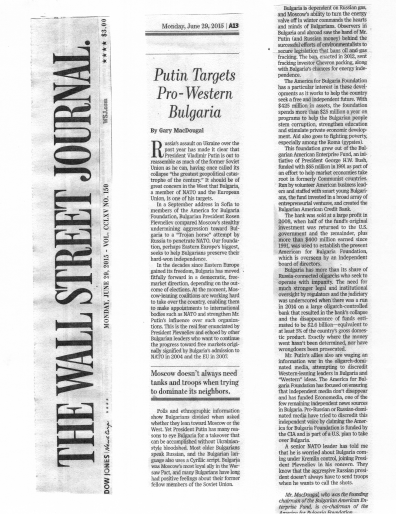The Wall Street Journal
6/28/2015
Gary MacDougal
 Russia’s assault on Ukraine over the past year has made it clear that President Vladimir Putin is out to reassemble as much of the former Soviet Union as he can, having once called its collapse “the greatest geopolitical catastrophe of the century.” It should be of great concern in the West that Bulgaria, a member of NATO and the European Union, is one of his targets.
Russia’s assault on Ukraine over the past year has made it clear that President Vladimir Putin is out to reassemble as much of the former Soviet Union as he can, having once called its collapse “the greatest geopolitical catastrophe of the century.” It should be of great concern in the West that Bulgaria, a member of NATO and the European Union, is one of his targets.
In a September address in Sofia to members of the America for Bulgaria Foundation, Bulgarian President Rosen Plevneliev compared Moscow’s stealthy undermining aggression toward Bulgaria to a “Trojan horse” attempt by Russia to penetrate NATO. Our foundation, perhaps Eastern Europe’s biggest, seeks to help Bulgarians preserve their hard-won independence.

Bulgarian President Rosen Plevneliev
PHOTO: EUROPEAN PRESSPHOTO AGENCY
In the decades since Eastern Europe gained its freedom, Bulgaria has moved fitfully forward in a democratic, free-market direction, depending on the outcome of elections. At the moment, Moscow-leaning coalitions are working hard to take over the country, enabling them to make appointments to international bodies such as NATO and strengthen Mr. Putin’s influence over such organizations. This is the real fear enunciated by President Plevneliev and echoed by other Bulgarian leaders who want to continue the progress toward free markets originally signified by Bulgaria’s admission to NATO in 2004 and the EU in 2007.
Polls and ethnographic information show Bulgarians divided when asked whether they lean toward Moscow or the West. Yet President Putin has many reasons to eye Bulgaria for a takeover that can be accomplished without Ukrainian-style bloodshed. Most older Bulgarians speak Russian, and the Bulgarian language also uses a Cyrillic script. Bulgaria was Moscow’s most loyal ally in the Warsaw Pact, and many Bulgarians have long had positive feelings about their former fellow members of the Soviet Union.
Bulgaria is dependent on Russian gas, and Moscow’s ability to turn the energy valve off in winter commands the hearts and minds of Bulgarians. Observers in Bulgaria and abroad saw the hand of Mr. Putin (and Russian money) behind the successful efforts of environmentalists to secure legislation that bans oil and gas fracking. The ban, enacted in 2012, sent fracking investor Chevron packing, along with Bulgaria’s chances for energy independence.
The America for Bulgaria Foundation has a particular interest in these developments as it works to help the country seek a free and independent future. With $425 million in assets, the foundation spends more than $25 million a year on programs to help the Bulgarian people stem corruption, strengthen education and stimulate private economic development. Aid also goes to fighting poverty, especially among the Roma (gypsies).
This foundation grew out of the Bulgarian American Enterprise Fund, an initiative of President George H.W. Bush, funded with $55 million in 1991 as part of an effort to help market economies take root in formerly Communist countries. Run by volunteer American business leaders and staffed with smart young Bulgarians, the fund invested in a broad array of entrepreneurial ventures, and created the Bulgarian American Credit Bank.
The bank was sold at a large profit in 2008, when half of the fund’s original investment was returned to the U.S. government and the remainder, plus more than $400 million earned since 1991, was used to establish the present American for Bulgaria Foundation, which is overseen by an independent board of directors.
Bulgaria has more than its share of Russia-connected oligarchs who seek to operate with impunity. The need for much stronger legal and institutional oversight by regulators and the judiciary was underscored when there was a run in 2014 on a large oligarch-controlled bank that resulted in the bank’s collapse and the disappearance of funds estimated to be $2.6 billion—equivalent to at least 5% of the country’s gross domestic product. Exactly where the money went hasn’t been determined, nor have wrongdoers been prosecuted.
Mr. Putin’s allies also are waging an information war in the oligarch-dominated media, attempting to discredit Western-leaning leaders in Bulgaria and “Western” ideas. The America for Bulgaria Foundation has focused on ensuring that independent media don’t disappear and has funded Economedia, one of the few remaining independent news sources in Bulgaria. Pro-Russian or Russian-dominated media have tried to discredit this independent voice by claiming the America for Bulgaria Foundation is funded by the CIA and is part of a U.S. plan to take over Bulgaria.
A senior NATO leader has told me that he is worried about Bulgaria coming under Kremlin control, joining President Plevneliev in his concern. They know that the aggressive Russian president doesn’t always have to send troops when he wants to call the shots.
Mr. MacDougal, who was the founding chairman of the Bulgarian American Enterprise Fund, is co-chairman of the America for Bulgaria Foundation.